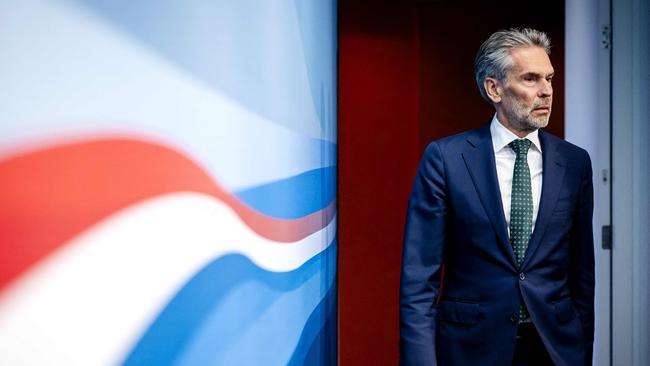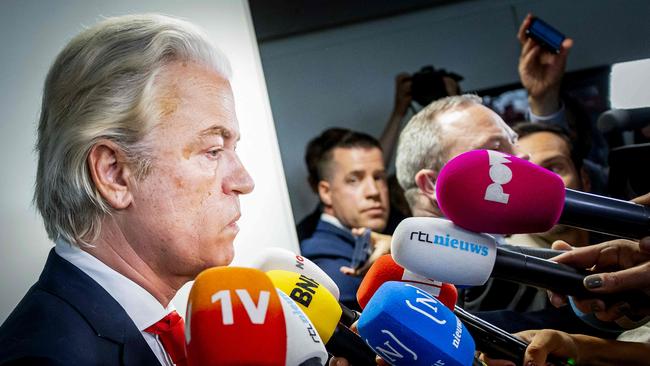Far-right Geert Wilders torpedoes Dutch coalition over immigration
Snap elections are likely after the far-right politician pulled his party out of the ruling bloc, accusing the other parties of not doing enough to curb immigration.

The Dutch governing coalition collapsed Tuesday after far-right politician Geert Wilders pulled out of the ruling bloc, accusing the other parties of not doing enough to curb immigration and setting the stage for a possible snap election.
Dutch Prime Minister Dick Schoof said hours later that he would resign, setting the stage for a snap election that will test whether Wilders, one of Europe’s most controversial politicians, can win power.
Wilders demanded last week that his coalition partners in the government of Prime Minister Dick Schoof sign a 10-point plan to slash immigration, including denying all new asylum requests and returning Syrian refugees now that the Middle Eastern country has a new government.
On Tuesday, Wilders announced on X that his party had quit the coalition. “We had no choice. I promised the voters the strictest asylum policy ever, but that was not granted to you,” he wrote.
Geen handtekening voor onze asielplannen.
— Geert Wilders (@geertwilderspvv) June 3, 2025
Geen aanpassing Hoofdlijnenakkoord.
PVV verlaat de coalitie.
The remaining parties, which lack a majority, could try to cobble together a new coalition in the coming days, but most analysts see new elections as the most likely outcome. The opposition coalition called for new elections after Wilders’ decision, saying the government had left the country “at a standstill for a year, while there is war in Europe.”
A new Dutch vote would be the latest test of whether far-right parties in Europe are still gaining ground amid weak economic growth and a surge in migration in recent years.
Having won a string of elections in recent years, the record is mixed so far this year: The far-right AfD made big gains in Germany but fell short of power, and a far-right party lost in Romania in a runoff. But this weekend in Poland, a nationalist and admirer of Donald Trump, Karol Nawrocki, won the country’s presidential election.
Wilders’s Freedom Party won the most seats of any party in a 2023 election, but lacked an outright majority and was unable to form a coalition with Wilders as prime minister. Instead, it joined a coalition with Schoof, a former head of the country’s intelligence agency, in charge. Migration and asylum policy in the coalition is headed by a member of Wilders’s party, Marjolein Faber.
In late April, the Freedom Party lost its lead in polling for the first time in 18 months according to a Dutch pollster Peil.nl. But in the most recent poll in late May, after Wilders published his 10-point plan on migration, his party was narrowly ahead.
Wilders, 61, is one of Europe’s most prominent and controversial politicians. He rose to prominence by warning of “an Islamic invasion” of Europe. He has called for the “de-Islamization” of the Netherlands and campaigned to ban the Quran and shutter mosques. He has also focused on immigration, saying that Dutch voters who want far lower levels are being ignored.
His election win in 2023 was built in part by focusing on living standards. He won broad support by arguing that high levels of migration were pushing up house prices and the availability of basic services, analysts said. Wilders played down some of his anti-Islam policies, such as calling for a ban on mosques and pledged to drop them to forge a coalition government.

Like in the US, immigration has become a hot-button political issue across most of Europe, a trend fueled by lackluster economic growth and posing a challenge to traditional center-right parties. Arguments over how best to control immigration have now brought down two successive Dutch governments, the first being then-Prime Minister Mark Rutte’s in 2023, said Jess Middleton, Senior Europe Analyst at risk intelligence company Verisk Maplecroft.
In Germany, the AfD is leading in some polls for the first time since its creation in 2013. In the UK, the Reform UK party, led by Brexit champion Nigel Farage, is also leading in the polls.
France’s far-right National Rally is the largest single party in the nation’s National Assembly, while the center-right Republicans and their allies hold 48 of the chamber’s 577 seats. In Italy, Giorgia Meloni became prime minister in 2022, backed by her populist party, Brothers of Italy.
Whether Wilders’ move will succeed in him taking power remains to be seen. If he can frame the immigration issue as central in the election, he could emerge the winner, said Pepijn Bergsen, a former Dutch official who now works at research firm Medley Advisors. But the government has had some successes on that front: After rising sharply in previous years, the number of new asylum applications fell last year by 16 per cent.
“Wilders probably looked at his poll ratings going down, realized muddling through was unlikely to improve them and gambled on a new election. He might still have a vague hope of becoming prime minister, especially after polling around 30 per cent in early 2024, but this will be an uphill battle to say the least,” Bergsen said.
Wall Street Journal



To join the conversation, please log in. Don't have an account? Register
Join the conversation, you are commenting as Logout